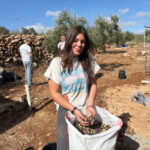(RNS) — Four days after winning New York City’s mayoral election, Zohran Mamdani performed Friday prayers with congregants at a mosque in Puerto Rico, having traveled there for an annual summit of New York politicians. At his first public event since the election, he spoke about equality, citing the inspiration of Malcolm X, and helped to distribute meals.
It was a fairly routine activity for any Muslim (minus the public remarks). At the same time, it was utterly endearing — attending Friday (Jummah) prayers like it was no big deal for the incoming mayor of the largest city in the United States.
In the last year of his second term, former President Barack Obama finally stepped inside a mosque for the first time, attending prayers at the Islamic Society of Baltimore. This came after the president had visited numerous churches, synagogues and other houses of worship over the previous eight years. Coming at the end of his time in office, the visit was as much of a “why now” moment as it was an acknowledgment of American Muslims, 85% of whom had voted for him for that second term, according to a 2012 CAIR exit poll.
Former Vice President Kamala Harris, in her brief presidential campaign, noticeably distanced herself from Muslim and Arab Americans organizations. The Democratic National Committee excluded Palestinian activists from the stage at its 2024 convention in Chicago, and Harris herself was criticized for excluding these same groups from her outreach as vice president to community leaders to curtail the war in Gaza.
Then there’s Mamdani, who recorded campaign ads in Arabic, Spanish, Bengali, Hindi and Urdu and crisscrossed the city visiting mosques, synagogues, churches, temples and gurdwalas — and also made a pivotal speech at a Bronx Islamic center in the last days of his campaign in which he leaned into his Muslim identity, denouncing Islamophobic attacks against him. He said he would set an example for the youth of the city by never hiding any part of himself.
His victory 10 days later was one of the most remarkable American political victories in modern times. A young Muslim immigrant from Uganda overcame $40 million pledged by billionaire donors to his opponents. While a fair number of New Yorkers and Americans are upset over his victory, many others have wholeheartedly embraced him.
For Muslims, Mamdani lives out his multifaceted identity in a most unbothered way, a breath of the freshest air. I spoke with Zainab Mozawalla, a law student in Long Island who volunteered for Mamdani’s campaign, who said he proved “that we have a voice.”
“We’re used to so much disappointment with politicians, and he emitted so much hope,” Mozawalla said.
That hope and pride are still being celebrated on social media, in countless WhatsApp conversations happening in families, among friends, in community and religious groups, on university campuses and wherever Muslims are gathering. They take pride in Mamdani’s Muslim faith, his South Asian and Ugandan background, his policies of affordability and his Palestinian-friendly views. That pride comes with the relief of being heard, of mattering.
So many Muslims also take pride in the election of Virginia Lt. Gov.-elect Ghazala Hashmi and in the reelection of state delegate Sam Rasoul in the Appalachian Mountains of southern Virginia. “A 70% victory in the Bible belt of Virginia for a Palestinian Muslim is really a validation, beyond just Democrats winning, that you can be bold on the Gaza genocide and still be victorious,” Rasoul told The Guardian.
Moving forward beyond campaigning, however, is the difficult and often dirty business of governing, and this is where those riding high today will meet reality tomorrow.
“In order to be successful, he has to be the mayor for everyone, not just the Muslims,” said Shaheda Quraishi, a physician in Long Island who canvassed for Mamdani. “You do hear whispers from different people in the community who may not align with everything he has done or is doing, and I think that’s OK. In order to make his agenda a reality, he has to be able to speak to [and make alliances with] all the different populations in New York.”
That may be difficult for some Muslims to watch. Yasir Qadhi, a resident scholar at the East Plano Islamic Center, said on Instagram that Mamdani didn’t win because he’s a Muslim, but in spite of it. “It is a sign of integration, a sign of civilizational strength, but it also presents challenges. … How can a Muslim be a mayor when they’re going to have to do things that are morally ambiguous? It is high time for Muslim communities to differentiate a politician from a cleric.”
Some Virginia Muslim communities have discussed this question over Hashmi’s years as a state senator. She has supported trans and LGBTQI communities, bothering more conservative Muslims in the state. That’s par for the course, said Razi Ali, a physician in Virginia. While the importance of Muslim Americans becoming elected officials cannot be undervalued, Ali said, representation matters for reasons beyond shared faith, race, nationality or culture.
“Those who now [wield] power and influence also have nuance and diversity of thought and experience, which will be so impactful in how they lead. That matters,” Ali said. “Our elected officials need to be tethered to the needs of the common man. Do I have enough income, food insecurity, job insecurity — these are kitchen table items that are important regardless of faith, of race, of [being] Republican or Democrat.”
In New York, Mozawalla said, there are pro-Palestinian supporters who are adamant that Mamdani shouldn’t compromise his values. The majority of Muslims who voted for him, she said, understand that compromises are part of governing. “There will be people in some spaces pressuring him, and I think that is good. I don’t worry about [Mamdani] getting too comfortable. I see him constantly trying to please everyone and be really, really helpful.”
In his election night victory speech, Mamdani said, referring to the main drag through his Astoria, Queens, neighborhood, “As we say in Steinway — ana minkum wa ilaikum,” which means “I am from you and with you.”
As his tenure of governing one of the most diverse and largest cities in America begins, the expectations upon him will be high. If he is to meet them, the “you” in that promise can be expected to expand, change and change again.



